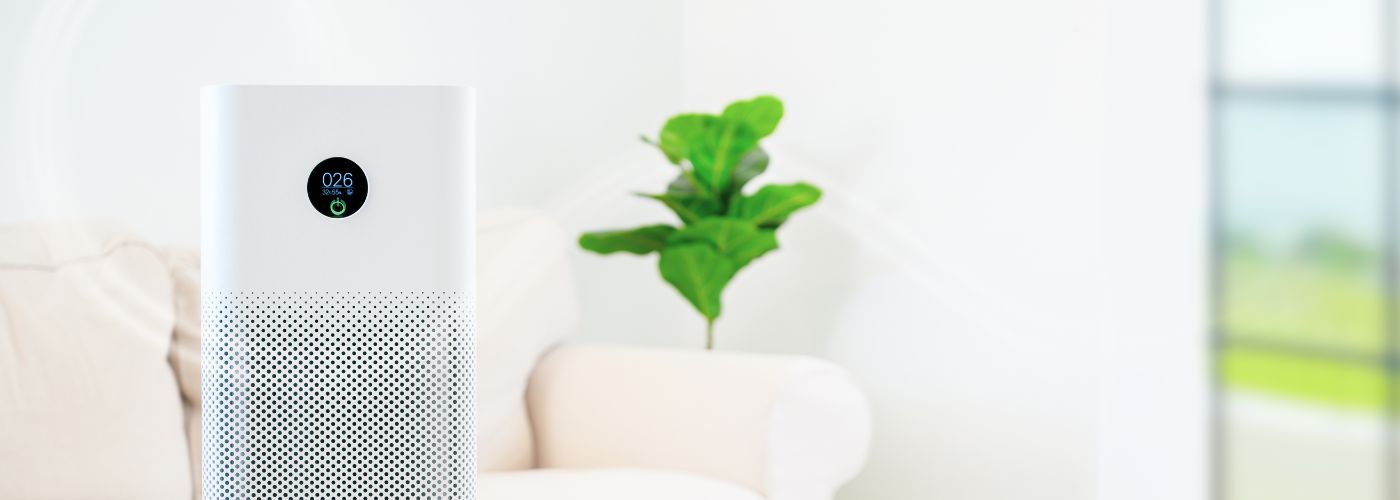Have you ever noticed how dusty your home feels even after cleaning? It might be time to consider an air purifier, but should you go for a whole house model or stick with a room-specific one? In this article, we’ll explore the key differences between a whole house air purifier vs room air purifier.
Differences Between A Whole House Air Purifier vs Room Air Purifier
When deciding between a whole house air purifier vs room air purifier, consider your specific needs and living situation. A whole house air purifier integrates with your HVAC system, filtering air throughout every room.
This option is excellent for families or individuals who suffer from allergies or respiratory issues, as it ensures consistent air quality across your entire home. However, installation can be costly and may require professional help.
On the other hand, room air purifiers offer flexibility and portability. They are perfect for targeting specific areas where you spend the most time, like your bedroom or living room.
Plus, with advancements in technology, many room purifiers now come with smart features that allow you to monitor air quality in real-time and adjust settings via an app.
If you prioritize convenience and cost-effectiveness, a room purifier might be the way to go. But if you’re looking for comprehensive coverage, a whole house system could be worth the investment.
Installation Differences Between Whole House and Room Air Purifier
When comparing a whole house air purifier vs room air purifier, the installation process highlights their distinct functionalities. Whole house systems are integrated into your home’s HVAC system, meaning they require professional installation.

This ensures that purified air circulates throughout every room, delivering consistent air quality. In contrast, room air purifiers are standalone units that you can easily set up in any space. Just plug them in, and they’re ready to work, offering flexibility in placement based on your needs.
Another key difference lies in the maintenance and filtration process. Whole house air purifiers usually have larger filters that last longer but need periodic replacement, often requiring HVAC service calls.
Room air purifiers, on the other hand, may require more frequent filter changes since they handle smaller areas. This makes them a convenient option for those who prefer DIY maintenance.
How Each Purifier Type Handles Pollutants
When it comes to tackling pollutants, understanding how each purifier type operates is essential. Whole house air purifiers work by integrating with your home’s HVAC system.

This means they can handle larger volumes of air and are effective against widespread contaminants like dust, pollen, and even volatile organic compounds (VOCs). Their ability to continuously circulate air makes them an ideal choice for families dealing with persistent allergens.
On the other hand, room air purifiers are designed for targeted purification in specific spaces. They excel at quickly removing pollutants from smaller areas, making them perfect for bedrooms or living rooms where you spend significant time.
Many models utilize HEPA filters to capture tiny particles, while others may include activated carbon layers for odors.
Each type has its unique strengths, and the choice between a whole house air purifier vs room air purifier largely depends on your specific needs and living situation.
Maintenance Needs For Both Purifiers
When considering the maintenance needs of a whole house air purifier vs room air purifier, it’s essential to recognize their distinct requirements. Whole house purifiers often utilize larger filters that need replacement every six months to a few years, depending on usage and the quality of the air they filter.
These systems are integrated into your home’s HVAC, so regular checks on the ductwork and overall system efficiency are necessary. This ensures that the air circulating throughout your home remains clean and free from allergens.
In contrast, room air purifiers tend to have smaller, more accessible filters that require more frequent changes, typically every three to six months. Additionally, because they operate in a specific area, it’s vital to keep them dust-free and away from obstructions for optimal airflow.
Regularly cleaning the exterior and ensuring the unit has enough space can significantly enhance its performance.
Comparing Power Consumption in Both Systems
When comparing power consumption, the whole house air purifier and room air purifier present distinct advantages and challenges. A whole house air purifier typically connects to your HVAC system, allowing it to filter the air throughout your entire home.
While this might seem energy-intensive, modern systems are designed for efficiency, often using less power than expected by leveraging variable speed fans and optimized airflow. This means you can enjoy cleaner air in every corner of your home without significantly spiking your electricity bill.
On the other hand, room air purifiers are generally more portable and less expensive upfront, but they can lead to higher cumulative energy use if multiple units are needed for larger spaces.
Each device operates independently, which can result in a constant drain on power, especially if they run continuously.
Unit Lifespan For Both Systems
When considering the unit lifespan of a Whole House Air Purifier versus a Room Air Purifier, it’s important to understand the differences in their design and usage. Whole house systems are engineered to last longer, often exceeding 10 years with proper maintenance.
They circulate air throughout your entire home, which means they handle a larger volume of air, requiring robust components that are built for durability.
In contrast, Room Air Purifiers typically have shorter lifespans, averaging around 5 years. These units focus on smaller spaces and can be subject to more wear and tear due to frequent use.
However, many room models offer replaceable filters, which can extend their effective lifespan if maintained regularly.
Ultimately, the choice between these two types of purifiers should not only consider longevity but also the specific air quality needs of your living space.
Frequently Asked Questions (FAQ)
It depends on your goals and budget. A whole house air purifier connects to your HVAC system and treats the air in every room, which is ideal if you want consistent air quality throughout your home. Room air purifiers, on the other hand, focus on individual spaces like bedrooms or living rooms and are great if you only need cleaner air where you spend the most time.
A whole house air purifier is a smart choice for families with allergies, asthma, or other respiratory issues, as well as homeowners who want long-term, whole-home air quality improvement. Because it’s integrated with your HVAC system, it quietly filters air in the background and helps reduce dust, pollen, and other pollutants across every room.
Whole house air purifiers usually have larger filters that last longer but may require professional service during HVAC maintenance visits. Room air purifiers often need more frequent filter changes—typically every few months—depending on usage and air quality. However, replacing their filters is usually a quick DIY task.
